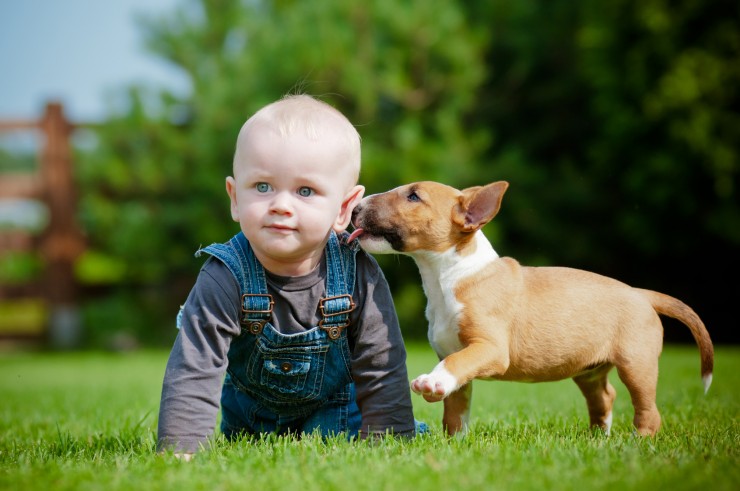

The majority of people whether pet owners or not, know that it's not such a good idea to let dogs lick kids faces, even if they are very fond of each other. The reason being that dogs are notorious for eating and picking up some pretty nasty things in their mouths. However, recent research suggests that dogs kissing the children is not such a bad thing after all. Read on to find out why this is so!
Studies have shown that dog's saliva is not as full of bad bacteria as was once thought and that the bacteria found in a dog's intestines may even play a vital role in helping prevent kids from developing asthma. On top of this, a dog's saliva can speed up the healing process when it comes to open wounds, so by a dog licking a sore or cut, it can be beneficial rather than bad. With this said, the question of whether you should let your dog lick a kid's face or not, remains something that each parent needs to decide for themselves.
At the end of the day, the best practice is to ensure that things are kept as hygienic and clean as possible when you share your home with a canine companion. Regular health checks at the vets are also a very good idea and so is keeping on top of any dental issues a dog may be developing or suffering from. The reason being that a dog's mouth as well as their intestines tend to harbour many types of bacteria, not to mention a few nasty bugs and parasites. All of which can easily be transmitted over to people and which can cause health problems for them. These transmittable diseases are known as being "zoonotic".
The majority of dogs (and cats) have a form of bacteria in their mouths called Pastuerella. This type of bacteria is responsible for causing skin rashes, they can attack lymph nodes and even trigger some quite severe infections that are notoriously hard to clear up. When a dog licks your child's face, they could pass this bacteria on to them in their saliva, although it is more likely for it to passed on through a dog bite or a cat scratch.
There are several types of bacteria that live in a dog's intestines which can cause very severe tummy upsets in people. The four bacteria found in your dog's intestines are Salmonella, Clostridia, E. Coli and Campylobacter. Your pet may not show any signs of being ill, but when they poo, the bacteria can be found in their faeces. When dogs lick their backsides, which they often do, the bacteria transfers to their mouths and therefore their saliva. However, more research is needed to find out whether or not your children would be at risk of having the bacteria transmitted to them should your dog lick their faces, but it's better to be safe than sorry and not tempt fate!
A dog's system can harbour a whole host of parasites and although they don't fall ill themselves, these same single cell and other parasites can make a person and more especially a child, seriously ill causing skin issues, blindness and could even be the cause of brain disorders, not to mention giving people a serious tummy upset. The eggs of these internal parasites are pooed out in a dog's faeces. A dog may have cleaned their bottoms and consequently got some of the eggs in their mouths which would then be transmitted to the kids in their saliva when they licked their faces!
The good news is that because these parasites have a very specific cycle they need to go through, apart from the parasites that cause Giardia and Cryptosoporidia, they are not able to infect a person when passed on in their egg stage, but again it's always better to err on the side of caution because the two most dangerous parasites mentioned above can infect a person just by a dog licking their faces!
The Ancient Egyptians believed that a dog's saliva helped speed up the healing process of a wound and modern day research has shown that it does contain some very beneficial healing properties one of which is a chemical known as "histatins" which help speed up cell regeneration. On top of this, when a dog's saliva touches the skin, it produces a substance called nitric oxide which prevents bacteria from taking hold in a an open wound. A protein was also found in a dog's saliva which is known as Nerve Growth Factor and it is this protein that's responsible for the speeding up the healing process.
When it comes to letting a dog lick a child's face, it is far better to err on the side of caution and not let them do it because although a dog's saliva does contain certain properties that help speed up the healing process, it also contains some pretty nasty things. Very young children would be more at risk of getting ill, but a child of any age should not let their pet lick their faces and need to be gently taught why it's not a good idea, being extra careful not to scare them!
Copyright © 2005-2016 Pet Information All Rights Reserved
Contact us: www162date@outlook.com